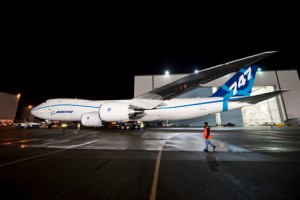
747-8 Paint Roll Out
Last week, Boeing showed off its “light” livery on the new Boeing 747-8 Freighter. This new Boeing livery saves time and cost, since it is less complex than their standard livery.
It has a simple white background, with stripe and “8” on the tail. I got a glimpse of the new livery myself while driving by Paine Field (don’t worry my passenger took that picture) and it looks even better in person than it does in pictures.
Check out the photo gallery of additional photos and video of the B747-8 Freighter (I love that wing).
follow via | web | twitter | email | rss |
Source: Seattle PI
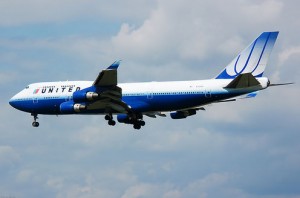
United Airlines livery
Thank goodness! United’s appearance has annoyed me for a while now. Flying on some of their planes is like time traveling back to the late 80’s. It seems United has had issues with deciding if they want to update their fleet or not.
Not too long ago they re-painted their fleet in a stormy clouds (my name) livery, which people didn’t like and didn’t last too long. I kind of liked it, even though it was dark, but they decided on a lighter livery (see photo). But they haven’t fully changed over their entire fleet (which I am ok with, b/c the new livery seems dated). It has been the slowest livery change I have ever seen.
The livery is not the only thing they have been slacking on. Anyone who has flown United Airlines in the last 10 years will see a familiar site: the same seats. They call the design “Tequila Sunrise” and I call it ’œdated and ugly’.
Good news! United plans to replace all the dated seats with new blue leather seats and they plan to re-paint all their aircraft. And not too soon! Brett Snyder with CrankyFlier.com recently flew on the last United Boeing 737 and it was obvious they were avoiding replacing those seats and I wouldn’t doubt other plans have the same ’œquick fix’.
United will also be updating their overhead bins, allowing more carry-on luggage and creating a friendlier atmosphere. The crew won’t be left out. Designer Cynthis Rowley is creating more trendy crew uniforms to match the airline’s new (or really consistent) interior look.
This also comes at a time where United Airlines is looking to purchase 150+ planes very shortly. Hopefully this is a sign that United is not going to be a dinosaur and fight for its survival. I wish them the best of luck!
follow via | web | twitter | email | rss |
Source: Gadling Image: Thomas Becker
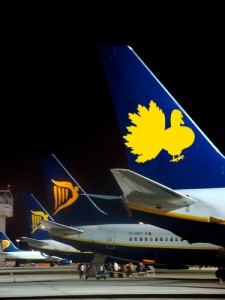
I love making fun of Rynair, because they are a bunch of Turkeys!
Happy Thanksgiving to everyone. I hope everything had safe and uneventful holiday travel and that you are having a better meal than this United Airlines turkey sandwich!
I might be in a food coma this weekend, so no promises of a bunch of big blogs 🙂
Orig Image: shadowsonclouds
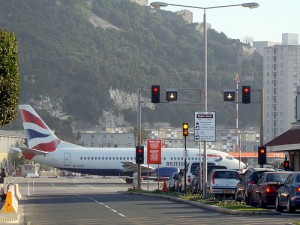
British Airways Boeing 737 G-LGTE stops traffic at Gibraltar Airport.
Gibraltar is a British territory located just south of Spain and is less than three square miles. The Gibraltar Airport is the closest airport to a city center (only about 1/3 of a mile) in the world and only five airlines currently serve the airport.
What probably makes it most unique is having the main road connecting Gibraltar to Spain, Winston Churchill Avenue, go right over the runways. Every time a plane takes off or lands, traffic must be stopped.
The airport is in the middle of being renovated. Not only will they be increasing the terminal three fold, they are also constructing a tunnel for vehicle and pedestrian traffic. Although this will make the city and airport run more efficiently, it the airport will lost a little of its unique character.
More Pictures:
* British Airways taking off
* Ariel showing the road, Giraltar Rock, and town
* Iberia Airbus A320 landing (they have stopped flying to Gibraltar as of September 2008)
* Google map satellite view
follow via | web | twitter | email | rss |
Image: kpmarek
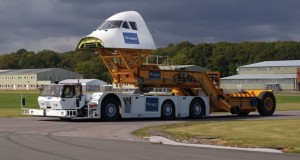
Ricardo's TaxiBot prototype in action.
Normally an airliner is pushed back from the gate with an airplane tug. Once the aircraft is cleared of any obstacles, the tug disconnects and the aircraft moves on its own power down the taxi way and takes off. When there are back ups on the taxi ways, airlines waste fuel and create additional pollution into the atmosphere.
According to research done by Airbus and Israel Aerospace Industries, taxiing at airports will cost about $7billion per year by 2012, will release about 18 metric tones of CO2 per year, and create about $350million per year in debris damage.
Things might change in the future. Ricardo, an engineering company, has successfully created a new tug called “TaxiBot” that connects to an airplane’s wheels, and pulls the aircraft around the airport. The TaxiBot uses the plane’s breaks, but uses its own power, allowing the jet to save fuel.
Ricardo CEO Dave Shemmans said, “We are extremely pleased to have been able to play such a central role in the development of this innovative concept which could dramatically reduce the CO2 emissions of commercial aviation while improving air quality and reducing noise pollution in the vicinity of the world’s major airports.”
Since the TaxiBot has shown its potential, Airbus and ground support equipment provider TLD have agree to help in the next stages of development. The TaxiBot currently requires a driver, but in future designs, it will be operated by the pilot of the plane.
follow via | web | twitter | email | rss |
Source: Ricardo via Gadling




